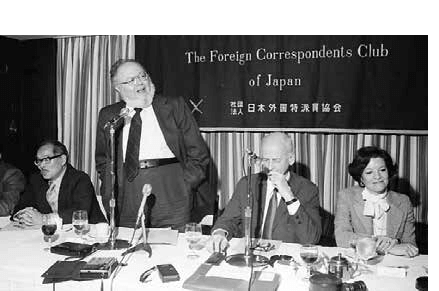Issue:
“DOOMSDAY” COLD WARRIOR AND FUTURIST HERMAN KAHN

Herman Kahn of the Hudson Institute, a frequent speaker at the FCCJ, untangled world affairs for our members on Nov. 28, 1977. Club Secretary Sam Jameson (Freelance), who moderated the event. To the right of Kahn is Johnny Fujii of Fairchild Publications, who is seated next to the shoulder of Tom Pepper, former Tokyo Bureau Chief of the Baltimore Sun who had been hired by the Hudson Institute several years earlier.
In the political scene of the 1960s and 1970s, Herman Kahn’s name ranked with that of Henry Kissinger and other Cold Warriors. He had parlayed his university physics major into a position as a military strategist and systems theorist at the Rand Corporation and become a sensation with publication of his 1960 book, On Thermonuclear War. In the book, he speculated on a “doomsday” device, which caught the popular imagination in a morbid way, and was reflected in Kubrick’s 1964 satiric masterpiece, Dr. Strangelove or: How I Learned to Stop Worrying and Love the Bomb. He followed up with several more publications on the potential effects of nuclear war and strategic options that influenced U.S. nuclear and military strategies.
With two colleagues, Kahn founded the Hudson Institute in 1961 as a policy research organization. As its head, he expanded his areas of interest to include economics, public policy issues and future studies. He was especially noted for his meshing of theoretical and practical matters, applying systems analysis, game theory and scientific forecasting tools as well as the scenario method. The scope of his activities included theories and publications that made him a controversial figure. His frequent appearances at the FCCJ attested to the attraction he held for journalists.
Of particular interest to Club Members were his futuristic takes on Japan. His 1970 tome, The Emerging Japanese Superstate: Challenge and Response, outlined much of the success later achieved by Japan. In 1979, another book on the Japan theme also made a splash. The Japanese Challenge: The Success and Failure of Economic Success, was co-authored with Thomas Pepper, who had been the Bureau Chief of the Baltimore Sun until he was recruited by Kahn and joined the Hudson Institute.
Herman Kahn headed the Hudson Institute until 1983, when a stroke ended his life at age 61.
— Charles Pomeroy

